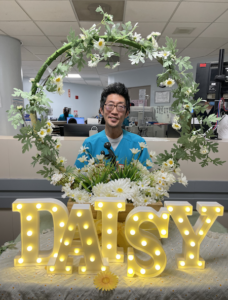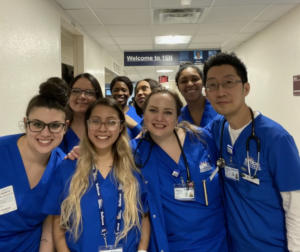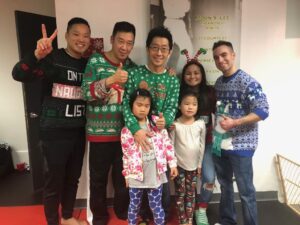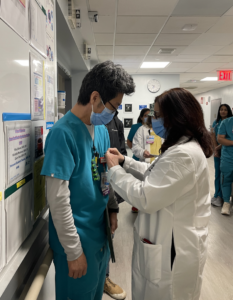March 18, 2024
“I looked into all the different programs,” says Ki Bang, a 2022 Nursing alumnus of Borough of Manhattan Community College (BMCC/CUNY) and father of two who changed his life’s course by pursuing a nursing career in his fifties—and was just awarded the The DAISY Award for Extraordinary Nurses.
“I was living in Queens at the time and looked at colleges closer to home than BMCC, but they didn’t offer night and weekend classes, and there was no way that I could stop working full time and take classes during the day,” explains Mr. Bang, who now works as an Registered Nurse (RN) in the Orthopedics department of Mount Sinai Hospital in New York City.
 He also looked at four-year programs, “but they were much more expensive,” he says. “Plus, I wanted to become a nurse as soon as possible. BMCC ticked off all the boxes. It was the only affordable nursing program that offered night and weekend classes.”
He also looked at four-year programs, “but they were much more expensive,” he says. “Plus, I wanted to become a nurse as soon as possible. BMCC ticked off all the boxes. It was the only affordable nursing program that offered night and weekend classes.”
BMCC’s Nursing Department is also known for its rigorous curricula in medical-surgical nursing care, pediatric care, maternal-newborn care and psychiatric nursing care.
Students hone their clinical techniques with human patients simulators in the BMCC Nursing Skills Laboratory and gain hands-on experience through the BMCC extern program that places them in hospitals throughout New York City.
Graduates who’ve earned an Associate in Applied Science (A.A.S.) degree in Nursing at BMCC are eligible to take the National Council Licensure Examination for Registered Nurses (NCLEX-RN) and enter the workforce, or they can transfer to a four-year college or university to complete their bachelor’s degree in nursing.
Classes start and Covid hits.
Mr. Bang enrolled at BMCC in 2019 and was accepted into the nursing program in January 2020. By March, the Covid pandemic was shutting down New York City.
“Almost overnight, we had to switch to virtual classes,” he says. “At times it almost felt like we were flying the plane while still building it. I was just thankful that I could continue with my degree program, despite everything going on in the world at the time.”
Attending a nursing program during a global pandemic brought up issues no one saw coming, such as the dangers faced by frontline medical staff.

It required resiliency to stay on track, Mr. Bang says.
“But when you’re intrinsically motivated to do something, you find a way, right? Despite all the hardships, I knew I wanted to become a nurse,” he says. “As nurses, you often have to pivot and react quickly to what’s going on around you.”
Nursing Professor Monique Cayo was key to setting a supportive tone, during that challenging time.
“Professor Cayo holds a special place in my heart because that first day we came in, one of the first things she said was, ‘The competition stops here.’”
This countered what Mr. Bang had heard, “that when you go into a nursing program, they’ll tell you to look to your left, look to your right, and then they’ll say, ‘Some of these people are not going to be here at the end of the program.’”
Professor Cayo, on the other hand, told the class, “You all need to support each other. You all need to help each other to get through this because it’s going to be difficult.”
Her students took that message to heart. “We developed a sense of camaraderie,” Mr. Bang says. “We would help each other, reach out to the people that were faltering or discouraged.”
They also created a group chat, “and five of us formed a little group and would support each other studying together or sharing notes,” he adds. “We pushed each other to continue.”
Strengthening that culture of support, “Professor Cayo personally drove to each one of the nursing students’ houses to deliver a special T-shirt to commemorate us finishing that crazy semester,” Mr. Bang says.
“It could be three in the morning; you could still reach out to her if you had concerns. Her dedication was amazing.”
“This is what I want to do.”

Now working in the Orthopedics department of Mount Sinai Hospital, Mr. Bang is a nontraditionally employed individual in terms of gender.
The Bureau of Labor Statistics reports that as of 2022, male nurses comprised about 12% of the national nursing workforce.
He was also a nontraditional student in the sense that he was almost 50 years of age when he enrolled at BMCC.
“I’m in my fifties now,” he says. “This is my third career, and I feel like this is what I was meant to do. I just feel so blessed and so lucky.”
Before making the switch to nursing, Mr. Bang worked in finance, having moved to New York as a young adult.
“I was born in South Korea,” he says. “Our family moved to Colorado when I was three. My father died when I was eight, and we moved to New York when I was 17.”
Mr. Bang worked in finance about six years, and then worked in IT for 17 years before landing at the Guttmacher Institute in 2017.
“My title was AV technician,” he says. “I handled the logistics of the in-person meetings, the Zoom meetings, made sure the mics and everything were working properly, as well as providing logistical support for the Board meetings.”
The Guttmacher Institute is a nonprofit research organization that advocates for reproductive and sexual health rights for women worldwide.
“I could really get behind their cause, and I felt great about helping them to do what they do,” he says.
At some point, though, he felt ready to take the next step in his life.
“My wife is a nurse,” says Mr. Bang. “I researched it and realized there was a growing need for nurses, and I was drawn to the work.”
One of the reasons he admired the field of nursing, relates to his daughter’s hospitalization when she was three.
“She had a necrotizing pneumonia in her lungs and lost a third of one of her lungs, but it regenerated and grew back,” he says.
“That whole time, they were amazing, the nurses and doctors. At some point I was like, ‘This is what I want to do.’”
“My superpower as a nurse is calming people.”

The DAISY Award was created in the memory of Patrick Barnes, who in 1999 at the age of 33, was diagnosed with the fatal autoimmune disease ITP (Immune Thrombocytopenia).
The family of Patrick Barnes was impressed not just by the clinical care he received, but by the compassion that nurses and the medical team showed during that dark time.
“DAISY” is an acronym standing for “Diseases Attacking the Immune System,” and The DAISY Award has recognized nurses at thousands of healthcare organizations and schools of nursing in the U.S. and around the world.
Here is one patient’s impression of having had Ki Bang as a nurse, as documented on the DAISY website.
“This was my first surgery on my femur, and I had concerns about pain, immediate walking ability, and post-op uncertainties,” the patient said.
“In Orthopedic Recovery, Ki eased my worries, explained medications and supported me through physical therapy. We shared a moment discussing films during an EKG session. I appreciated Ki’s humor and dedication, making the recovery days reassuring.”
The ability to allay a patient’s fears is a critical part of a nurse’s skill set.
“We educate patients about their medications, the process, what’s going to happen next, physical therapy and things like that,” says Mr. Bang, “but I would say one of my superpowers as a nurse is calming people. I’m able to help reduce their anxieties.”
As a DAISY winner, he was treated to a ceremony at his worksite, a Healer’s Touch Sculpture and DAISY honoree pin.
DAISY Award winners can also take advantage of reduced tuition rates at the Chamberlain University College of Nursing, reduced rates for professional development courses, and opportunities to engage with the Daisy Foundation’s partner organizations, such as the American Association for Men in Nursing and the American Organization for Nursing Leadership.
“A career in nursing can go so many ways,” Mr. Bang says. “BMCC was where I got my first degree. Now I’m in my first role as a nurse, and I look forward to continuing this deeply fulfilling journey.”
STORY HIGHLIGHTS
- 2022 Nursing alumnus Ki Bang — a father of two who changed his life’s course by pursuing a nursing career in his fifties — was just awarded The DAISY Award for extraordinary nurses
- Mr. Bang works as an RN in the Orthopedics department of Mount Sinai Hospital in New York City
- The Bureau of Labor Statistics reports that as of 2022, male nurses comprised about 12% of the national nursing workforce

